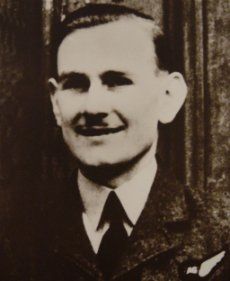Woodbridge, Stanley James
- Date of birth:
- August 29th, 1921 (Chelsea/Londen, United Kingdom)
- Date of death:
- February 7th, 1945 (POW Camp, Burma)
- Buried on:
- Commonwealth War Cemetery Taukkyan
- Nationality:
- British (1801-present, Kingdom)
Biography
Do you have more information about this person? Inform us!
- Period:
- Second World War (1939-1945)
- Rank:
- Flight Sergeant
- Unit:
- No. 159 Squadron, Royal Air Force
- Awarded on:
- September 28th, 1948
"Flight Sergeant Woodbridge was a wireless operator in the crew of a Liberator aircraft which crashed in the jungle in Burma whilst engaged in an operation against the Japanese on 31 January 1945. Together with five other members of the crew, he was captured by the Japanese. All six were subjected to torture at the hands of their captors in an endeavour to obtain information which would have been of use to the Japanese Intelligence Service. Eventually, the four non-commissioned officers were separated and conveyed by motor transport to a forest, where they were put to death by beheading. Three officers and three non-commissioned officers of the Imperial Japanese Army were subsequently brought to trial by a Military Court charged with the torture and murder of the four airmen, they were all found guilty. Three of them were hanged and three were sentenced to terms of rigorous imprisonment. At the trial, it was revealed that the Japanese concentrated their efforts on Flight Sergeant Woodbridge, the wireless operator, in an endeavour to obtain technical information regarding wireless equipment, secret codes, wavelengths, etc.
A Japanese technical officer was detailed to carry out the interrogation, and the services of two interpreters were engaged, but, in spite of repeated torture which including kicking, beating with belts and with a sword, Flight Sergeant Woodbridge steadfastly refused to reveal any information whatsoever. The final interrogation took place at the site of the execution; when it was obvious to the unfortunate prisoner that he was to be put to death, he maintained his courageous attitude to the end, merely remarking that if the Japanese were going to kill him they should do it quickly. After all efforts to make him speak, including further torture, were found to be fruitless, this gallant non-commissioned officer was beheaded on 7 February 1945. Flight Sergeant Woodbridge behaved throughout with supreme courage. His fortitude, loyalty to his country and his complete disregard for his own safety, even unto death, constitute one of the highest examples of valour in the annals of the Royal Air Force."
- Period:
- Second World War (1939-1945)
- Period:
- Second World War (1939-1945)
- Period:
- Second World War (1939-1945)
- Period:
- Second World War (1939-1945)
Sources
- Photo: George Cross Database
- - Second Supplement to The London Gazette Issue 38414 published on the 24 September 1948







